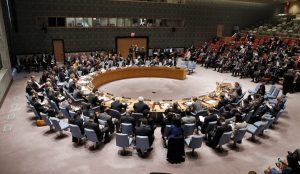By Sami Zaptia.

London, 8 June 2018:
The UN Security Council imposed unprecedented sanctions yesterday on six leaders of human trafficking and smuggling networks operating from Libya, the Dutch Foreign Ministry has revealed.
The sanctions had been introduced by the Netherlands in May, but Russia had delayed the resolution while it established the evidence against the accused. The sanctions impose a travel ban and an asset freeze on the six named individuals.
It is the first time that the UN Security Council has targeted human traffickers/smugglers.
The list of six sanctioned individuals include four Libyans and two Eritreans:
- Ahmed Al-Dabbashi – Libyan – leader of the Al-Dabbashi militia operating in the Zawia area.
- Musab Abyqrain – Libyan – a leading cross-border human trafficker
- Mohamed Keshlaf – Libyan – head of the al-Naser militia controlling Zawia refinery
- Abdelrahman Al-Milad – Libyan – head of Zawia Coast Guard
- Fitiwi Abdelrazak – Eritrean – a leading human trafficker from the Horn of Africa to Libya
- Ermias Ghermay – Eritrean – a leading human trafficker from the Horn of Africa to Libya
‘The Netherlands wants to use its Security Council seat to improve the lives of refugees and migrants in Libya and prevent them from making the dangerous journey across the Mediterranean,’ said foreign minister Stef Blok.
‘’The sanctions are part of a wider approach to tackling human trafficking and people smuggling, which the government intends to step up in line with the coalition agreement,’ explained Mark Harbers, State Secretary for Justice and Security. Over the past few years, large groups of migrants and refugees have crossed the sea from Libya to Europe.
Criminals make big money out of people smuggling and exploiting migrants, who often encounter serious violence and suffer in other ways on their journey. Late last year a CNN report showed victims of human trafficking being sold at a slave market in Libya. Criminal networks benefit from the country’s culture of impunity. ‘This Dutch initiative sends a clear message,’ said Mr Blok. ‘We are tackling human trafficking in Libya.’
The Dutch Public Prosecution Service, Ministry of Foreign Affairs and Ministry of Justice and Security worked together to build a solid foundation for these sanctions, in a unique partnership between diplomats and legal experts. They made use of a combination of reports by authoritative NGOs, criminal investigations and UN reports on Libya. The Netherlands worked closely with several partners on this matter, in particular France, Germany, the UK and the US.
The Dutch initiative had the support of all UN Security Council members and various African countries, as well as the Libyan authorities. ‘They know that these criminal networks are seriously destabilising the country,’ Mr Blok said. The support from Libya and other countries in the region is essential.
The sanctions are not an isolated measure; they are a key part of a comprehensive effort by the entire international community to bring peace and stability to this war-torn country. The Libyan authorities would like to see the list expanded. The Netherlands plans to work with Libya and other partners to seek out ways of doing that, the Dutch government statement added.





